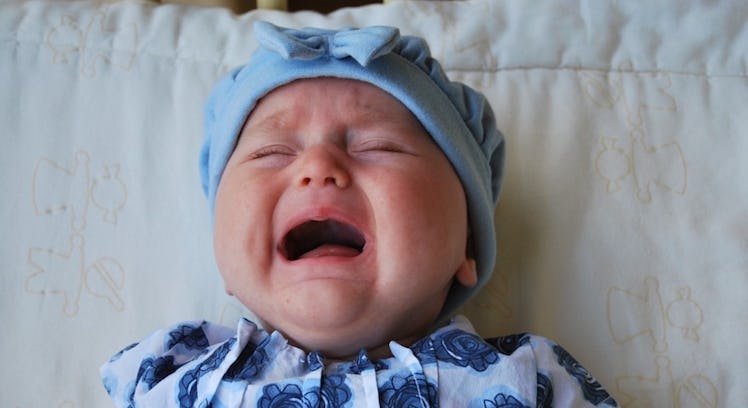Got a Fussy Kid? Be Nicer to Your Wife.
New research shows that how supported a mother is in her relationship may affect the occurrence of infant colic.

New moms who are happy with their relationships and postpartum social support network have babies with a lower risk of colic according to new research from Penn State. More than that, the researchers found that as the mother’s happiness increases there is a proportionate decrease in the likelihood their new baby will be a crying, fussy nightmare. All of which should give fathers a powerful motivation to get in the baby-care fray and make momma happy.
Colic has long been associated with poor maternal mental health connected to adverse social conditions. Penn State researchers wanted to discover if positive social conditions such as support from partners, friends, and family could have the opposite effect. Their data consisted of pre- and postnatal interviews with 3006 moms connected to the statewide First Baby Study. Researchers looked primarily at responses to questions regarding satisfaction with community, family, and partner support both before and after birth, along with reports of colic, which was defined as crying or fussiness for at least three hours a day. Considering the study focused only on first-time mothers, it’s unclear if results can be extrapolated to mothers who already have children.
After controlling for confounding factors like maternal race or ethnicity, marital status, and maternal postpartum depression, researchers discovered that a mother reporting happiness and support is far less likely to report having a colicky baby. This association was strongest with new moms who said they were happy with the help and support of their partner. This was particularly true for partners who were reported as being very helpful and approached the baby with love and warmth.
But researchers noted that those feelings of support correlate to decreased colic risk regardless of the individuals they’re connected to. While partner support had the greatest effect, new moms who reported being happy with family or friends also reported less colic. As did women who reported having someone to go to with personal problems. Even single mothers happy with a community support system reported less colic.
Colic has long been a pediatric conundrum, as evidenced by its definition: prolonged crying for no apparent reason. Because of that central mystery, treating colic can be a questionable undertaking. Research has pointed to a bizarre diversity of possible treatments including abdominal massage with lavender oil, spinal manipulation, and hypoallergenic milk and decreased stimulation. However, this is the first research to suggest a strong link to maternal happiness as key to colic reduction.
While study authors were unsure of why maternal happiness was linked to reductions of colic, the study should be an eye-opener for expecting fathers. Colic is the absolute worst, for both parent and child. And if a happy mother reduces the risk of hours of wailing, dads to be should be doing all they can to keep their baby-momma on the smile train.
This article was originally published on